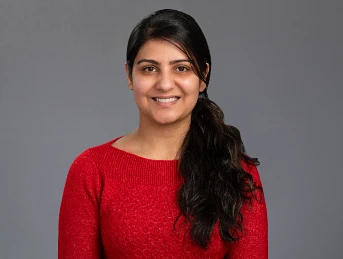
Ankur Naqib, PhD
Director, Rush Research Bioinformatics Core
Assistant Professor, Department of Anatomy and Cell Biology
Ankur Naqib, PhD, is an Assistant Professor in the Department of Anatomy and Cell Biology at Rush University and serves as Director of the Rush Research Bioinformatics Core (RRBC). He leverages his strong background in bioinformatics and bioengineering to develop and apply computational tools for analyzing large-scale biological datasets. His expertise spans genomics, microbiome, metagenomics, and transcriptomics, enabling him to collaborate with researchers at Rush and beyond to uncover patterns, trends, and correlations that shed light on complex biological systems. With extensive experience in core facilities, Dr. Naqib has led the Bioinformatics Core at Rush since 2019 and played a pivotal role in establishing and growing RRBC. Additionally, RRBC collaborates closely with the Genomics and Microbiome Core Facility (GMCF) to deliver actionable biological insights to researchers.
Selected publications
- Keshavarzian, A., Green, S.J., Engen, P.A., Voigt, R.M., Naqib, A., Forsyth, C.B., Mutlu, E. and Shannon, K.M. (2015), Colonic bacterial composition in Parkinson's disease. Mov Disord., 30: 1351-1360. https://doi.org/10.1002/mds.26307
- Naqib, A., Poggi, S., Wang, W., Hyde, M., Kunstman, K., Green, S.J. (2018). Making and Sequencing Heavily Multiplexed, High-Throughput 16S Ribosomal RNA Gene Amplicon Libraries Using a Flexible, Two-Stage PCR Protocol. In: Raghavachari, N., Garcia-Reyero, N. (eds) Gene Expression Analysis. Methods in Molecular Biology, vol 1783. Humana Press, New York, NY. https://doi.org/10.1007/978-1-4939-7834-2_7
- Naqib A, Poggi S, Green SJ. 2019. Deconstructing the Polymerase Chain Reaction II: an improved workflow and effects on artifact formation and primer degeneracy. PeerJ 7:e7121 https://doi.org/10.7717/peerj.7121
- Deng, S., He, W., Gong, AY., Naqib, A., et al. Cryptosporidium uses CSpV1 to activate host type I interferon and attenuate antiparasitic defenses. Nat Commun 14, 1456 (2023). https://doi.org/10.1038/s41467-023-37129-0
- Perez-Pardo P, Dodiya HB, Naqib A, et alRole of TLR4 in the gut-brain axis in Parkinson’s disease: a translational study from men to miceGut 2019;68:829-843. https://gut.bmj.com/content/68/5/829.info
Complete list of publications on Google Scholar (https://scholar.google.com/citations?user=U55Y3I4AAAAJ&hl=en&authuser=2).

Adit Chaudhary, PhD
Research Bioengineer
Dr. Chaudhary’s research training and background are in the fields of microbial ecology, metagenomics and bioinformatics. He did his PhD in Biological Sciences at University of Illinois at Chicago, followed by postdoctoral training at Loyola University Chicago and Scripps Institution of Oceanography, UC San Diego. His doctoral and postdoctoral research involved the investigation of aquatic microbial community dynamics using modern omics techniques in combination with field surveys, incubation assays and microbial culture experiments. At Rush, Dr. Chaudhary's research focuses on the analysis of complex microbial communities associated with diverse hosts and environments. He collaborates with Stefan Green, PhD on a NASA funded project to analyze the effect of spaceflight on the fecal microbiome of rodents using shotgun metagenomics. He also works with Supriya Mehta, MHS, PhD to assess the impact of water sources and rainfall on the vaginal microbiome and reproductive health of young women in rural Kenya. More generally, he assists the Rush Research Bioinformatics Core (RRBC) and the Genomics and Microbiome Core Facility (GMCF) in supporting the needs of research faculty at Rush University as well as external collaborators by conducting microbial bioinformatics analyses.
Selected Publications
- Chaudhary A, Kauser I, Ray A, Poretsky R. Taxon-Driven Functional Shifts Associated with Storm Flow in an Urban Stream Microbial Community. mSphere. 2018 Jul 5;3(4). doi: 10.1128/mSphere.00194-18. PMCID: PMC6034075.
- Chaudhary A, Dunn ST, Kelly J, Hoellein TJ. Plastic microbiome development in a freshwater ecosystem. Sci Total Environ. 2022 Nov 20;848:157697. doi: 10.1016/j.scitotenv.2022.157697. PMID: 35914595.
- Chaudhary A, Turner S, Poretsky R. Bacterioplankton respond with similar transcriptional activity to allochthonous dissolved organic matter in coastal and offshore Lake Michigan. Limnology and Oceanography. 2021 June; 66(8):3162-3175.
Complete list of publications on Google Scholar (https://scholar.google.com/citations?hl=en&authuser=1&user=GP93u6cAAAAJ).

Neha Joshi, MS,
Bioinformatics Scientist
Neha Joshi is a Bioinformatics Scientist with extensive experience in next-generation sequencing (NGS) and the development of bioinformatics pipelines. She holds a Master’s degree in Bioinformatics from Indiana University and has built her career working in leading research institutions, including Vanderbilt University Medical Center and Northwestern University prior to joining RUSH University. Her expertise lies in the analysis of complex genomic datasets, including RNA-seq, metagenomics, microbiome, single cell RNA seq and spatial transcriptomics.
At Rush University Medical Center, Joshi contributes to the Rush Research Bioinformatics Core (RRBC) by leveraging her proficiency in high-performance computing and advanced bioinformatics tools to support research faculty and external collaborators. She has a particular interest in the integration of multi-omics data to uncover comprehensive biological insights and has been instrumental in optimizing pipelines for diverse sequencing technologies. Joshi's work has significantly contributed to the understanding of genomic mechanisms across various biological contexts, leading to new discoveries and improved approaches in genomic research and data analysis.

Surabhi Naik, PhD
Bioinformatics Scientist
Dr. Naik specializes in whole genome sequencing (WGS), spatial and single-cell transcriptomics, RNA sequencing (RNA-seq), methylation, and microbiome analysis. Dr. Naik’s work involves developing and optimizing advanced bioinformatics pipelines to analyze complex datasets, enabling the integration of various omics data to uncover comprehensive biological insights. Before joining Rush University Medical Center, she gained significant experience as a Biostatistician at the University of Tennessee Health Science Center, where she designed and implemented bioinformatics pipelines for diverse sequencing technologies, including 10X Genomics single-cell RNA Seq, bulk RNA and small-RNA seq. Her research also explored microbiome-transplantation interactions, enhancing our understanding of the gut microbiome's role in transplantation outcomes. Dr. Naik has also contributed as a Health Data Science Fellow at Insight, Boston, developing machine learning models to predict the early onset of acute respiratory distress syndrome (ARDS) in ICU patients, and as a Graduate Research Assistant at the University of Memphis, where she integrated clinical and epigenetic data to predict adverse childhood effects.
Selected publications
- Zahr RS, Mohammed A, Naik S, Faradji D, Ataga KI, Lebensburger J, Davis R. (2024) Machine Learning Predicts Acute Kidney Injury in Hospitalized Patients with Sickle Cell Disease. American Journal of Nephrology, 55 (1): 18-24; https://doi.org/10.1159/000534864
- C Kuscu, Y Mallisetty, S Naik, Z Han, CJ Berta, C Kuscu, CP Kovesdy, K Sumida (2023). Circulating microRNA profiles for premature cardiovascular death in patients with end-stage kidney disease. Journal of Clinical Medicine, 12(15), 5010; https://doi.org/10.3390/jcm12155010
- Naik S, Mohammed A. (2023) Consensus Gene Network Analysis Identifies the Key Similarities and Differences in Endothelial and Epithelial Cell Dynamics after Candida albicans Infection. International Journal of Molecular Sciences. 2023, 24(14), 11748; https://doi.org/10.3390/ijms241411748
